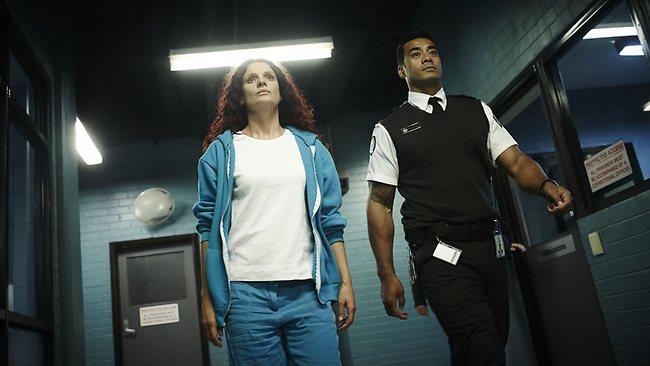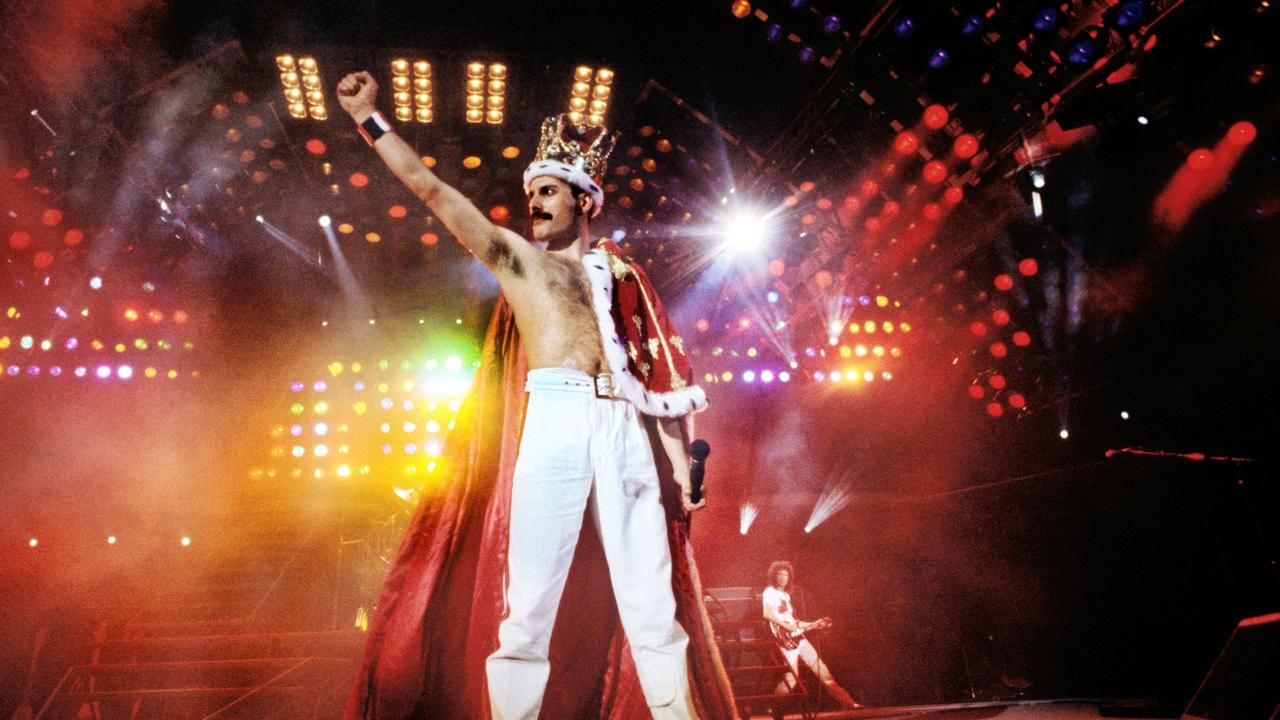Hard time again in Wentworth
QUEEN Bea is back in an intense reimagining of cult series Prisoner.

WELL before the internet dominated our lives, one local TV drama demolished the entrenched myth of the passive consumer.
You remember the so-called "couch potato", captive in front of the screen, shaped by TV's messages? As an idea it focused on the ways "the goggle box" was seen to fail in measuring up to the standards of the old media.
But Prisoner, the local soap opera set inside Wentworth Detention Centre, a fictional women's prison, first broadcast on Ten on February 27, 1979, and running for 692 episodes, became a cult. It simply refused to vanish. Many fans sought each other out and created their own Prisoner social communities.
They were active rather than passive consumers, fans of the series who took possession of it; they were what cultural critics would come to call - it did take years for them to take TV seriously - "textual poachers".
When the internet arrived, these communities here and overseas united in an online site that continued public discussion of the show's ideas, characters and storytelling techniques. They still have parties to celebrate certain episodes and possibly continue to conceal corrective services outfits in their wardrobes for special occasions.
This didn't happen, at least so vociferously, with other well-remembered series such as Number 96, The Box, and The Sullivans. And Prisoner is still screening on Foxtel's 111 Hits channel as its No 1 show and constantly attracting new fans. It's been broadcast since March last year, when it was slyly purchased to stop the new commercial digital channels grabbing it to fill all that empty air.
But more significantly, Prisoner has also been brilliantly, imaginatively revived, or "reimagined" as we like to say in this post-postmodern era, by FremantleMedia with a highly cinematic HBO look for the network's SoHo channel.
And it really is something, intense and glossy, violent and intelligent and, wittily couched in the vernacular of action movies, superbly directed by Kevin Carlin (Killing Time). Wentworth is all sinew and style, roaring excitement and, in its very different way when compared to the original, just as much fun.
This is a series that must look to exist, and it looks terrific under establishing director Carlin's stewardship. There's a nightmarish hue to Craig Barden's photography - abstract jiggles of harsh neon - that's hard to forget, setting just the right pictorial context for Wentworth as both purgatory and a proving ground, a place of hard, sad time. As there was in the recent crime drama Killing Time, much of which was also set in a prison, there's a disturbing mix of sentimentality and nihilism, a lyricism of disgust that informs the production.
To get a sense of just how good this contemporary adaptation is - it is set concretely in the present day - you have to take a peek at the gorgeously trashy original serial so cleverly picked up by Foxtel. It's a full-on melodramatic soapie with the most unsettling mixture of acting styles that run the gamut from Method to Brechtian, from Shakespearean to Seriously Camp. Just dip in and be a little dazed; the story is always blatantly self-explanatory -- at the moment the wife of a drug baron, played with some sultriness by Lindy Davies, is running the joint, on remand but treated like a princess, and maybe about to grass her hubby to the cops. Or so they hope.
The show had its roots in the similar British drama series Within These Walls, but this local serial was altogether much tougher. The series was produced by the Reg Grundy Organisation and it might just be the most unglamorous show in TV history. But, rare for that time, Prisoner showed women in control of their own stories, not waiting for blokes to tell them what to do. It also allowed the best local actresses to flex their acting chops: the likes of Peta Toppano, Carol Burns, Sheila Florance, Colette Mann and Amanda Muggleton.
And flex them they did: Prisoner was also one of the most violent shows of its era. Many will remember that famous first episode in 1979, when Bea Smith crushed Lynn Warner's hand in a steam press. Val Lehman played Bea; for a time she was famous, then TV forgot her, even if her fans haven't. Lynn was played by the ethereal Kerry Armstrong, already showing signs of that slightly attenuated style of acting.
Alan McKee in his book Australian Television: A Genealogy of Great Moments placed that graphic and explicit scene at the centre of our cultural archive, noting just how transgressive it was during the 70s to show women who were unashamedly physical. These were real women, never afraid to muss up their make-up or dirty their pretty clothes. When the series launched, the press advertising used the line, "If you think prison is hell for a man, imagine what it's like for a woman."
The show examined in detail the way women dealt with incarceration and separation from their families, and also the recurring theme of released inmates often being drawn into a cycle of recidivism. Within the walls of the prison, the main themes of the series were the interpersonal relationships among the prisoners, the power struggles, friendships and rivalries. Prisoners hanged themselves in their cells; there were fatal stabbings, bashings and riots; and there was a great deal of unrequited sapphic passion.
There ain't much glamour in Wentworth either, as it covers the same themes but far more grimly, its sexuality also more overt. It's a serial thriller that builds relentlessly, moment by moment, relationship by relationship, clever stroke by clever stroke, taking you in and making you its own.
As with those Danish noir serials of which we've recently become so enamoured, The Killing and Borgen, you don't want Wentworth to stop, especially when and where it does, and so callously, at the end of episode one. You want to shout, "You bastards; what happens now?" (The conclusion represents one of the greatest cliff-hangers in Australian TV, astonishing in its bravura.)
At the start we are introduced to Bea Smith, now played so convincingly by Danielle Cormack (brilliant as sexy sly grogger Kate Leigh in the recent Underbelly Razor), a former hairdresser who once ran a small but profitable salon. She's attractive, with dark red hair, and a good listener too but, along with her daughter Debbie, she is powerless in an abusive marriage. A desperate action results in life-changing circumstances.
The first episode, written by Peter McTighe from a story by the show's creator Lara Radulovich, is a kind of morality play about evil, damnation and free will. It implicates us in the way it has us barracking, not for an evil person but for someone we know inevitably will become one. Even if we have never seen the original Bea, there are enough clues in the way circumstances treat the new girl - quickly known as "Red" for her unruly copper tresses - in the episode that points that way.
At times it reminded me of Breaking Bad, the hit series focused on a mid-life crisis gone wrong for an underachieving high-school chemistry teacher who becomes a drug dealer after discovering he has lung cancer. Similarly, Wentworth presents us with the notion that morality is never static but always a personal choice. Bea Smith is portrayed as someone impossible not to like or at least to feel sympathy for, but by the time the episode finishes we have glimmerings of why she might deliberately abandon the light for darkness. And McTighe's script is rich in detail and teeming with incident.
This is simply riveting storytelling, delivered at a rocketing pace and with terrifying plausibility.
Production designer Robbie Perkins adds to the sense of authenticity too, with the exterior of the prison yard with its razor wire, which features extensively. It's so realistic that nearby residents in Melbourne's eastern suburbs, where the show is filmed, complained to the producers that they hadn't been notified a prison was being erected so close to their homes.
The acting throughout is authentic and authoritative, too, especially Cormack, so sweet at times but a psychopath in the making. Already fully formed and sporting a sometimes frightening insolence is Francesca "Franky" Doyle, played swaggeringly well by Nicole da Silva. She's a gen Y lesbian, sexily tattooed and determined to be top dog. Catherine McClements is righteous and competitive as Wentworth's governor Meg Jackson, hardline and unpopular, playing a man's role in a system dominated by them. She keeps her temper, just, but then it's been on a leash for so many years she knows she can whistle it back anytime she cuts it loose. Robbie Magasiva is strong as corrections officer Will Jackson and seems to have a subjective understanding of the cycle of addiction afflicting so many of his charges.
And Chris McQuade almost steals the show from Cormack, da Silva and McClements with a virtuoso turn as Jacqueline "Jacs" Holt, still the prison's top dog, despite Franky Doyle's best efforts to supplant her.
McQuade has one of those voices that sells lots of water beds late at night, and she uses it here to cajole, intimidate and frighten. This is simply one of the great performances, McQuade's voice fuelled by vituperation, working out Holt's anger vicariously on whomever gets in her way. She is wonderful to watch.
IT'S a little hard to believe, but the ABC's Jennifer Byrne has been leading discussions about those seemingly unfashionable objects called books for seven years now. And one might be especially incredulous as predictions of the death of books abounded when it started. "The print medium is a doomed and outdated technology, a mere curiosity of bygone days destined soon to be consigned forever to those dusty unattended museums we now call libraries," Brown University professor and William Faulkner Award-winning author Robert Coover confidently, and famously, predicted in The New York Review of Books back in 1992. And for the next decade or so it was assumed the print medium was about to be eclipsed as a cultural and commercial artefact. But books are still everywhere and people love talking about them.
Seven years ago, tapping into the worldwide popularity of reading groups, the ABC created a book club everyone could join. Hosted by the chatty Byrne, one of TV's great talkers, First Tuesday Book Club became a classic ABC show in the age of the new book. It was an intelligent, often amusing local slant on a literary life that has become global, democratic and increasingly uninhibited.
"As a matter of fact, half-way through this year it will be the eighth year, because we started in the middle, in July," says Byrne. "I used to count them off, then I stopped counting but it is extraordinary really; longevity is so hard to attain."
Her permanent guests are still the cleverly acerbic writer Marieke Hardy and newspaper literary editor Jason Steger and the show is still recorded in the round in front of a live audience, approximating an intimate book-club gathering. "We've kind of grown into ourselves," Byrne says. "We've never done a show without the three of us together, and that's a rare thing on the telly." This year, though, the titles have changed a little; there's new music; and the show is now called The Book Club, although it still appears on the first Tuesday of each month.
There are two rules about this kind of program, Byrne says, "negative cousins" she calls them: "We tried that and it didn't work", and "That's not TV". From the start she was aware of both - the history of failed book shows and the difficulties of translating the literary to the small screen. Most TV producers believe the medium always needs pictures to translate the words on the page, but Byrne took a punt with interesting conversation.
She's succeeded; and she knows how to keep her show moving, impatient with the received and the banal. And it's still compelling, the culture of the book club both a reference and an inspiration. Byrne has proved that TV in fact loves talking heads when they are intelligent and witty, especially when they're chatting about books.
There's more too from the seemingly indefatigable Byrne, who in the next six weeks delivers a literary feast. In addition to the regular Book Club, she's also presenting three other literary discussions under her "occasional" title Jennifer Byrne Presents. These are special episodes screening on selected Tuesdays, beginning this week with British author Ian McEwan, and followed by equally fascinating interviews with PD James, Ian Rankin and Margaret Atwood.
I like the way she she so magnanimously finds merit in all genres, not merely the highbrow and worthy -- is pleased, enthralled and disturbed by books of all kinds.
The great critic Kenneth Tynan once said, "At any level criticism must be accurate reportage of what has taken place outside you; at the highest level, it is also accurate reportage of what has taken place within you." And Byrne is never short of subjective opinion. I'm sure she would never call herself a critic, but she's TV's best literary journalist. In fact, she's the only one.
Wentworth, Wednesday, 8.30pm, SoHo.
The Book Club, Tuesday, May 7, 10pm, ABC1, and the first Tuesday of every month.



